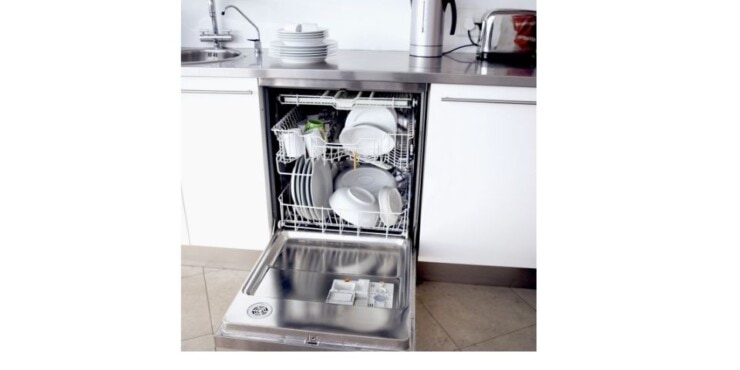Dishwashers are one of the most useful and convenient appliances in the kitchen. There’s no need to waste time washing dishes by hand when you can load up a dishwasher with clean, dry dishes and let it go to town.
The dishwasher has become a part of modern life such that many households won’t even consider getting rid of their dishwashers or even having fewer than two because they wouldn’t know what to do with themselves. Ever wonder how many amps a dishwasher uses? Well, this article will answer exactly that.
How Many amps Does a Dishwasher Use?
Dishwashers use an average of 10 amps so they require a dedicated circuit. If you have an older home, your kitchen may only have one 15 amp circuit to power the stove, microwave, and refrigerator.
This can be problematic if you try to run a dishwasher at the same time as these other appliances because your dishwasher will not work properly.
You may also have trouble running more than one appliance at once if you live in an apartment complex. In this case, it’s best to check with the property manager before purchasing any new appliances or electronics.
They may not allow it or will charge extra for it. The size of the dishwasher determines the amount of energy it uses, but on average, a dishwasher uses about 10 amps at 120 volts.
This means that if you have a 15 amp circuit with two outlets on it, one of them will be unusable while the dishwasher is running.
If you have a 15 amp circuit with three outlets on it, you’ll need to turn off one of them when using the dishwasher or risk tripping the breaker. If your home has an older electrical system or your circuit breaker has reached its full limit for amperage (usually 50 or 60 amps), installing a new circuit may be necessary to accommodate your new appliance.
You can also ask an electrician if there’s any way to run two circuits from one breaker box instead of having a separate breaker box for each appliance, but this won’t work for all homes and may require rewiring some areas of your house

Can a Dishwasher be on a 15 amp Circuit?
Yes, a dishwasher can be on a 15 amp circuit. But you need to be aware of the limitations of the circuit you’re using. In general, circuits are rated at 15 amps, but that doesn’t mean that they can provide 15 amps continuously or even for any extended period of time.
I would certainly use one on a 15 amp circuit, but it’s best to check with your local code authority. The NEC (National Electric Code) is the standard that most jurisdictions follow.
If you can’t find your local code online, look in your local phone book or call the phone company for more information about your local codes. The NEC does not specify maximum amperage for appliances except for freezers and refrigerators (which must have circuits rated at 20 amps or more).
However, it does specify other requirements that may not be compatible with 15A circuits. For example, an appliance may require special overcurrent protection devices (circuit breakers), grounding conductors, etc.
A dishwasher probably requires these devices already but double-check with your local code authority to make sure everything will work smoothly before installing any new electrical equipment into your home.
Do you need a dedicated circuit for a Dishwasher?
Yes, It is required. A dishwasher is a heavy appliance that uses a lot of electricity. If you are using an older home, or if you have been experiencing some electrical issues, installing a dedicated circuit for your dishwasher may be necessary to avoid future problems.
so, If you want to run your dishwasher, you need to have a dedicated circuit for it. In most homes, the kitchen is on a 20-amp circuit. If you are running an air conditioner, microwave, and coffee maker as well as other appliances on the same circuit as your dishwasher, there may not be enough power left to run the dishwasher.
If your home has been wired correctly, the outlet where you plug in your dishwasher should have enough capacity to handle its needs. If you are unsure of whether or not the outlet can handle a dishwasher, consult an electrician before proceeding with the installation.
The best way to determine if your home has been wired correctly is to look at the box where all of your outlets are installed. This box will have terminals that indicate whether or not they are connected to a fuse or breaker (or both). If there is no connection between an outlet and either device, then the wiring is probably incorrect and should be inspected by an electrician before using it for any purpose other than lamps or appliances without motors (such as fans

